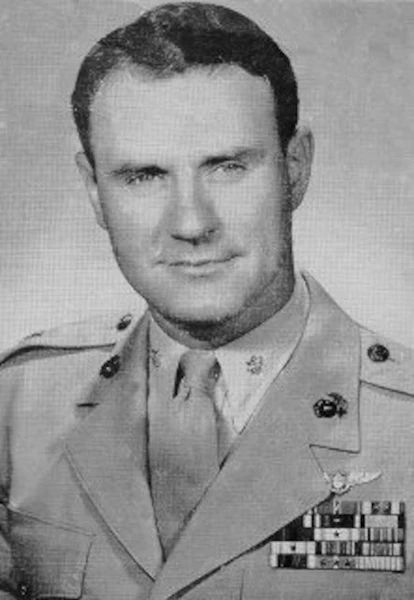His goal was to go over the ominous looking cumulonimbus thunderstorm cloud that was forming just ahead of him.
Rankin watched his altimeter as the jet continued to gather altitude.
At 45,000 feet he could still see the wispy tops of the storm.

He let his jet climb.
At 48,000 feet, he was now well over the top of the storm.
Rankins fingers eased on the stick and the jet levelled off.

His wingman, Lt Herbert Nolan, who was following Rankin on another Crusader did the same.
The skies then started to get hazy and Rankin could see that a nasty storm was on the way.
It was still half an hour before touchdown.

A series of jolt followed and several warning lights on his instruments panel lit up in amber.
The one that he feared the most was labelled FIRE.
Rankin responded by cutting back on the power to ease the stress on the engine.
At the same time, he radioed his wingman that he might have to eject.
Reducing power apparently worked because the FIRE alarm went out.
With hydraulic power gone, maneuvering the aircraft became impossible.
The only course of action left was to eject.
Rankins altitude at over 47,000 feet was much higher for a safe bail out.
The temperature outside was well below freezing and atmospheric pressure was dangerously low.
Rankin was clad in nothing more than a summer-weight flying suit.
He did not think a pressure suit was necessary for this flight.
An F-8 Crusader, the throw in Rankin was flying.
It gave me a peculiar sense of relief because I knew I was going out.
The ejection seat, at least, was not defective.
As soon as Rankins body came in contact with the minus 70 degree air, his extremities froze.
I felt as though I were a chunk of beef being tossed into a cavernous deep freeze.
It felt as if I were on fire.
Then, seconds later, the burning sensation turned to a blessed numbness.
Meanwhile, the sudden change in air pressure blew up his insides and his body began to expand.
I could feel my abdomen distending, stretching, stretching, stretching, until I thought it would burst.
I had never known such savage pain.
I was convinced I would not survive; no human could.
Lieutenant Colonel William Henry Rankin
The cloud was now getting thick and dark.
A typical free fall from that altitude should not have taken more three and half minutes.
Maybe he had passed the 10,000 feet mark and the parachute malfunctioned.
Perhaps he was only couple of hundred feet from the ground, hurling towards it.
It was all over now, I thought, the ordeal had ended.
Rankin found himself tossed about and shot upwards in violent gusts of rising air.
I became a veritable molecule trapped in the thermal pattern of heat engine.
But it was no gentle to and fro swing.
I went up, out, around and down as if on a speeding centrifuge.
I could feel blood rushing to my feet, then my head.
Turbulence was only part of the trouble.
The most violent were the lightning and thunder.
I used to think of lightning as long, slender, jagged streaks of electricity; but no more.
The real thing is different.
Then the rain started, in torrential drenching sheets.
The rain was so dense that Rankin feared he would drown.
Sometimes, I found myself gasping for air as if I actually were drowning.
While the rain almost threatened to have him drowned, large hails pelted Rankin with bruising force.
Luckily, Rankin had his helmet on which protected him from sure concussion.
His body, however, was covered with black and blue welts.
Rankin lost track of time.
He had given up trying to look at his watch.
Eventually, Rankin found the air getting smoother and the rain more gentle.
Moments later, Rankin had dropped out of the cloud.
He had only about 200 to 300 feet of ceiling left to orient himself for a landing.
After several minutes assessing his situation and inspecting his limbs for broken bones, Rankin looked at his watch.
It was 6:40 PM.
He had spent forty minutes bobbing up and down in the belly of the monstrous storm.
I must have been a startling if not frightening sight.
With time and care, he gradually regained his health and strength.
In due course, Lt. Col. Rankin resumed his duty, returning to his responsibilities.
References:# William Rankin,The Man Who Rode the Thunder